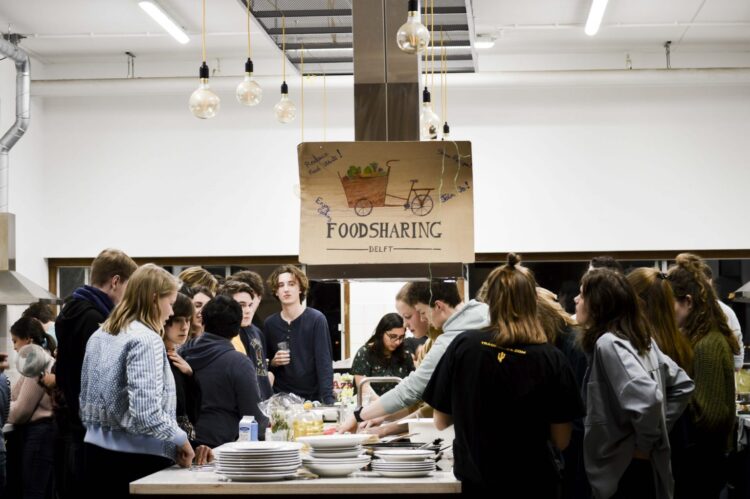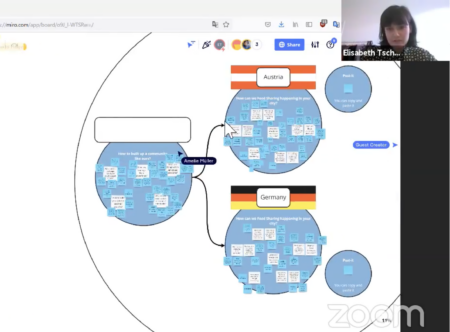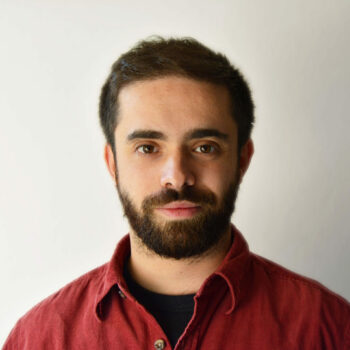Participation as a means to scale food sharing
On the occasion of the DESIGNSCAPES UnConference, Elisabeth Tschavgova guided an interactive workshop to explore the characteristics of the local green initiative ‘Food Sharing Delft’ and its replicability across Europe. The discussion with the international audience unveiled opportunities for the local initiative in Austria and Germany, and further demonstrated how design can contribute to the spreading of best practices across countries.
Scaling social innovation through design
Increasingly, a number of local initiatives are popping up like daisies in different cities across Europe. They are oftentimes led by mixed groups of practitioners, active citizens, at times even institutions, who share the common goal of bringing positive social transformations in their respective contexts. Despite the remarkable success of many of these social innovation initiatives, their specificity and strong connection to their territories sometimes make it hard to scale their practices and impacts across different contexts. Cities oftentimes differ in their culture; this difference may grow even more when talking about scaling initiatives across different countries.
Well aware of this challenge, the Participatory City Making Lab has studied the role that design can play in supporting the scaling of social innovation in a great variety of projects. It can be concluded that positive impacts beyond hyper-local applications, make social innovation more capable of contributing to systemic change. For example, the three graduate students Dheebak Odayakulam Balasubramaniam, Maria Belén Buckenmayer, and Chiara Marradi, who joined the European project DESIGNSCAPES have developed new knowledge and tools to support local innovation initiatives throughout the complex process of scaling social impact.
The Lab organized an international session at the DESIGNSCAPES Un-conference to take stock of the successful student projects on scaling innovation through design, to further expand social impact across Europe, by learning from the local “Foodsharing Delft” initiative active in Delft.

Foodsharing Delft
‘Foodsharing Delft’ aims to “raise awareness about how to reduce food waste around Delft”. The grassroots initiative takes care of picking up food waste from local shops and the market, to then distribute it using a communal fridge at their disposal.
With the goal to accelerate the transition towards a community-based food waste-free society, Foodsharing Delft brings together different citizens and stakeholders of Delft, locals, students, local businesses, united by the goal of reducing food waste. Beyond being sustainable by saving and redistributing food waste, the initiative aims at creating a grassroots movement based on awareness, and for this, it provides opportunities to make new connections among active citizens within and outside Delft, for example through specific community events denominated ‘no-waste dinners’.

Elisabeth Tschavgova is a member of the initiative’s committee, and a student of the Participatory City Making Lab. With the Lab, she has been conducting her Honours Programme Master research project investigating the role of design in restoring participation and democracy across Europe. Through her research, Elisabeth also considered the role of local initiatives such as Foodsharing Delft in stimulating more active participation of citizens across the European Union.
On the occasion of the DESIGNSCAPES Un-conference event closing the three-year-long European project, Elisabeth organized and facilitated the session Scaling food sharing initiatives, and explored with an international audience of stakeholders the opportunities for replicating the local initiative “Foodsharing Delft” across other European countries.
Scaling food sharing initiatives
For the session, Elisabeth Tschavgova designed a co-creative activity to reflect and explore together with an international audience of interested stakeholders, how to scale the food initiative Foodsharing Delft across other countries in Europe, and reflect on the relationship between citizens, policymakers and designers in doing so.
Active and founding members of Foodsharing Delft were invited to the session, together with an international group of stakeholders and active citizens from Germany and Austria, interested in replicating Foodsharing Delft in their local contexts.
The event was introduced by Ingrid Mulder, director of Participatory City Making Lab and lead of the TUDelft team within the DESIGNSCAPES project. After the introduction, Elisabeth guided participants through a highly interactive workshop with the aim of unveiling the characteristics of the local green initiative ‘Food Sharing’ Delft and opportunities for its replicability across Europe.

Foodsharing founding members were first asked to share a bit of the history and goal of their initiative in Delft. Afterwards, participants were engaged in a co-creative activity trying to think about and enact how they would start up a Foodsharing community in their home country. To facilitate participants in this activity, questions were shared with them prior to the session, which differed according to their relationship with the initiative. For example, while Foodsharing members addressed how to build a ‘Foodsharing community’, the questions for the Austrian and German representatives taking part in the session helped them reflect on how to make something like Foodsharing happen in their country.
Building on their answers, Foodsharing representatives kicked off the activity giving some valuable input and insights on their community, which helped to further foster the discussion. Next, the participating stakeholders from Austria and Germany illustrated and elaborated on their thoughts and ideas on how the initiative could be replicated in their local contexts. From this base, the activity led then to a more open discussion involving all present participants that dived deeper into the possibilities, challenges and strategies for scaling up the practices and impact of Foodsharing. Remarkable was the interaction between the stakeholders from Austria and Germany, pointing out cultural obstacles and opportunities in the different cultures.
Finally, Elisabeth opened up the floor for a final reflection on the session. Prompting everyone to express how they experienced it and whether they saw potential in similar activities to facilitate the spreading of sustainable initiatives more broadly across Europe.
Unveiling future opportunities and collaborations for Foodsharing Delft
Throughout the session, Elisabeth observed how participants really engaged in a rich debate on the Foodsharing project, resulting in a growing enthusiasm towards the initiative. Interestingly, the different participants identified multiple (and sometimes unexpected) contributions that such an initiative could bring in their own contexts and communities, even complementary to the core mission of reducing food waste.
Participants from Germany saw for example the opportunity through Foodsharing to fight the increasing loneliness and isolation caused by Covid. And others saw the chance to contribute to solving social challenges such as supporting single parents, elderly people as well as students, with access to food. One of the Austrian participants, for example, stated: “I will do a little research if there is any Foodsharing community in Graz. Until today I didn’t think about it, but it is a great way to support students in a university town!”
Together with opportunities, also some possible challenges emerged in the discussion. One was for example the possibility that a community like Foodsharing might run into obstacles due to the concern some Austrians share in regards to foreigners in their city, seeing them as taking advantage and getting food for free for which they didn’t work for.
Finally, throughout the session participants could also discuss some interesting strategies for the initiative’s replicability and embedment in Austrian and German local cultures and contexts. Among them, the opportunity of creating incentives for citizens to join ‘Food Sharing’, events to raise awareness on the mission of food waste reduction (e.g., public cooking) in collaboration with local restaurants and pubs, or connecting to other local sustainable communities to grow as a collaborative learning network.
Overall, the session really helped to foster insightful discussions as well as concrete ideas for the local initiative of Foodsharing Delft to replicate across Europe. Even more importantly, through her session, Elisabeth really managed to really build up the enthusiasm of the international audience towards the local initiative. At the end of the session, founding members of Foodsharing Delft were enthusiastic about seeing how much potential their local green initiative has for scaling in other countries. While the various stakeholders participating mentioned to be already looking forward to taking part in future follow-up events and activities, in order to explore further how to help the initiative scale in their contexts.
All in all, this experience showed once again how careful use of design can be valuable to structure and stimulate highly collaborative and engaging events, such as the “Scaling food sharing initiatives”. And more importantly, how through such events designers can concretely support the spreading of these best practices across cities, as well as across Europe.
